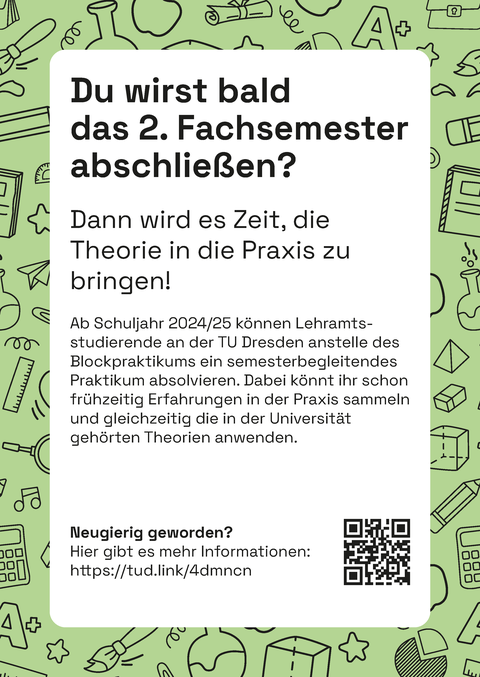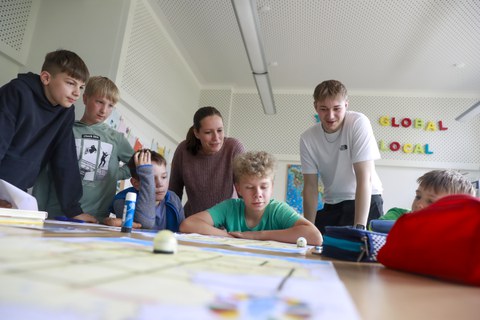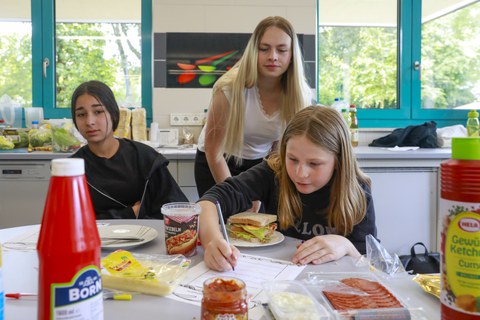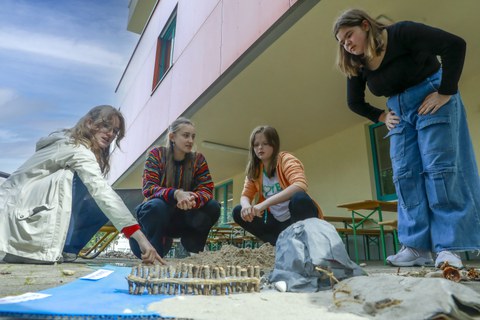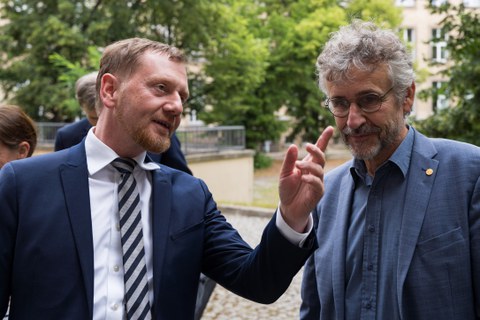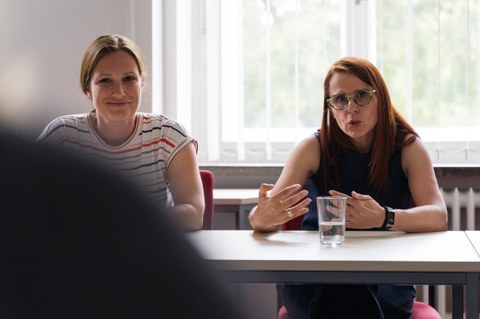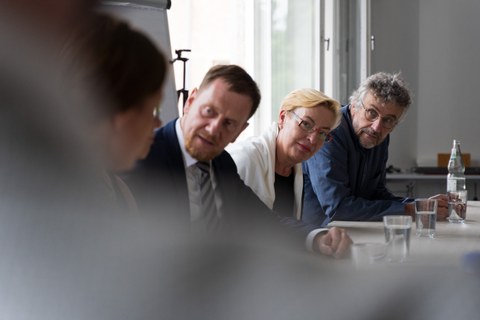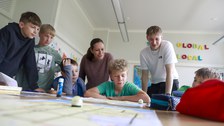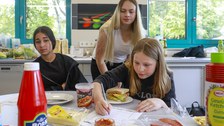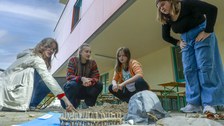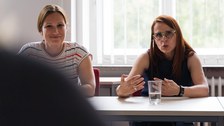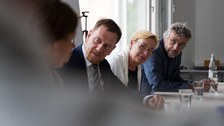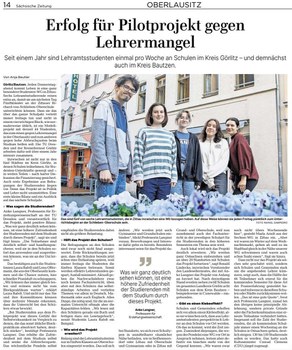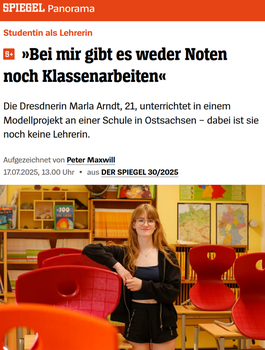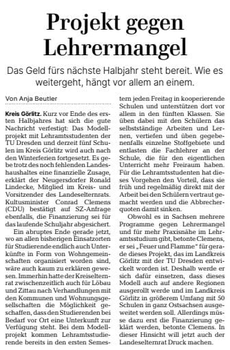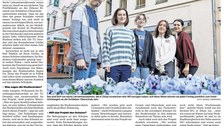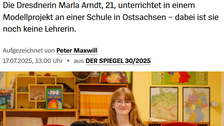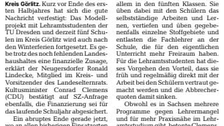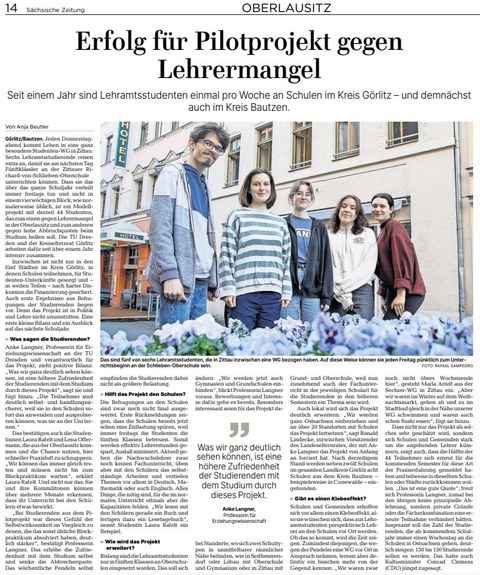ALSO - Alternatives Lehramtspraktikum an ausgewählten Schulen in Ostsachsen
Auf dieser Seite finden Sie allgemeine Informationen zu ALSO, dem semesterbegleitenden Schulpraktikum. Folgen Sie diesen Links für aktuelle News, Informationen für Studierende, den Medienspiegel und Publikationen.
Inhaltsverzeichnis
- „In Schule hineinwachsen“ – Praxiserfahrungen kontinuierlich und zielgerichtet sammeln
- Aktuelles im Schuljahr 2025/26
- Erste Erfolge sind sichtbar - Pilotprojekt gegen Lehrermangel wächst
- Das semesterbegleitende Praktikum - entwickelt an der Universitätsschule Dresden
- Fördernde Organisationen
- Pressekontakt
„In Schule hineinwachsen“ – Praxiserfahrungen kontinuierlich und zielgerichtet sammeln
Marla ist auch im Schuljahr 2024/25 wieder beim Pilotprojekt in Ostsachsen dabei. Im Video berichtet sie von ihren Erfahrungen aus der 1. Pilotphase. © TU Dresden
Seit Beginn des Schuljahrs 2024/25 können Studierende des Lehramts an der TU Dresden bereits frühzeitig kontinuierlich Erfahrungen in der Praxis sammeln und diese angeleitet reflektieren und mit Theorien verbinden lernen. Das wird möglich mit einem veränderten Praktikumsformat und einer engen Zusammenarbeit der TU Dresden mit den Praktikumsschulen - auch in höheren Semestern.
Wie das Praktikum bisher lief:
Studieren im Lehramt heißt vor allem Theorien und Forschungspraktiken an der Universität kennen zu lernen. Dieses Wissen müssen Sie dann selbst in die eigene Praxis transferieren oder in der Praxis förmlich übersetzen. Das erste Format, in dem Sie dies leisten, ist das Blockpraktikum A.
In Vorbereitung dieses Blockpraktikums besuchen Sie im Juli/August eine einführende Veranstaltung, in der Sie vor allem in schulrechtlichen Dingen unterwiesen werden und die Anforderungen für den Praktikumsbericht besprochen werden. Dann gehen Sie im September für 100 Stunden in die Praktikumsschule und idealerweise werden Sie durch einen Mentor in der Schule begleitet. Wie diese Begleitung aussieht, ist ganz abhängig von den Gegebenheiten in der Schule und dem jeweiligen Mentor/ jeweiligen Mentorin. Nach Ihrem Praktikum besuchen Sie im Oktober eine Auswertungsveranstaltung. Zu diesem späten Zeitpunkt fehlt häufig die Relevanz sich nochmal mit erlebten Situationen auseinanderzusetzen, denn Sie haben die Praktikumsschule und das Praktikum bereits hinter sich gelassen. Es fehlt nur noch der Praktikumsbericht, dafür bekommen Sie noch Empfehlungen. Spätestens wenn Sie diesen abgegeben haben, ist für Sie das Praktikum Vergangenheit.
In diesem Praktikumsformat müssen Sie es selbst schaffen, die in der Universität gehörten Theorien sinnhaft in Ihre pädagogische Praxis zu überführen. Dies ist nicht einfach, einige Studierende verzweifeln daran, dies soll jetzt anders werden:
Wie es auch möglich ist:
Sie erhalten im Studium systematisch wöchentlich die Möglichkeit, Praxiserfahrungen zu sammeln, diese kontinuierlich zu reflektieren und vor allem in Seminaren mit der gehörten Theorie zu verbinden. Mit diesen wöchentlichen Erfahrungen können Sie selbst die Seminare und Vorlesungen in der Universität bereichern, weil die kontinuierliche Praxis Sie in die Situation versetzt, Theorien und Modelle anhand eigener Erfahrungen zu hinterfragen, und Sie die Möglichkeit bekommen, diese Gedanken gemeinsam mit den Projektleitenden zu diskutieren.
Welche Aufgaben Sie im Praktikum übernehmen und welche Unterstützung Sie erhalten, erfahren Sie in den FAQ - Fragen und Antworten für interessierte Studierende.
Aktuelles im Schuljahr 2025/26
Onboarding für Lehramtspraktikant:innen startet an Schulen in den sächsischen Regionen
Im Schuljahr 2025/26 absolvieren etwas 100 Studierende der TU Dresden ein semesterbegleitendes Lehramtspraktikum. Nach den Herbstferien starten sie an 16 Schulen in Ostsachsen, im Kreis Sächsische Schweiz / Osterzgebirge und im Erzgebirgskreis. Im September begann die Vorbereitung mit Seminaren an der TU Dresden und mit Besuchen vor Ort. Gemeinsam mit den Projektleiterinnen besuchten sie ihre Einsatzschulen. Die zukünftigen Lehrkräfte lernten sich gegenseitig im 4er-KlassenTeam und die Kolleg:innen kennen. Viele Kommunen begrüßten die Studierenden in den Rathäusern, zeigten bei einem Stadtrundgang nicht nur die teilnehmenden Schulen und die bereitgestellten Praktikums-WGs, sondern auch welche Vorteile Schulen in ländlichen Regionen haben.
Neu sind im Schuljahr 2025/26 die 12 weitere Schulen ländlichen Raum, aber auch der Mittwoch und der Donnerstag als zusätzliche Praktikumstage. Sie ergänzen den Freitag, der weiterhin als Einsatztag erhalten bleibt. Für die Studierenden bedeutet die Auswahlmöglichkeit aus mehr Kommunen, Schulen und Wochentagen mehr Flexibilität und erleichtert die Integration des Lehramtspraktikums in ihren Studienalltag.
Studierende begleiten Schüler: Projekt gegen Lehrermangel in Sachsen wird ausgeweitet
Nach guten Erfahrungen in Görlitz und Bautzen wird das "alternative Lehramtspraktikum" (ALSO) nach den Herbstferien auf weitere Schulen ausgeweitet. Das hat das sächsische Kabinett beschlossen, wie das Kultusministerium mitteilte. Neben weiteren Oberschulen in Ostsachsen sollen Studierende dann auch in den Landkreisen Erzgebirge und Sächsische Schweiz/Osterzgebirge Praxiserfahrung sammeln.
Lehramtspraktikum wird ausgeweitet: Studenten helfen an mehr Oberschulen aus
Sächsische Zeitung, 16.10.2025
Maßnahme gegen Lehrermangel auf dem Land: Sachsen will mehr Lehrerinnen und Lehrer für Schulen im ländlichen Raum gewinnen. Mit einer neuen Form des Praktikums können angehende Lehrkräfte schon während des Studiums an der TU Dresden regelmäßig an Oberschulen Praxiserfahrung sammeln. Sachsen weitet das erfolgreiche Modellprojekt aus der Oberlausitz nun auf weitere Oberschulen auf dem Land aus. Das hat das Kabinett beschlossen.
Weitere Berichte finden Sie im ALSO-Medienspiegel.
Erste Erfolge sind sichtbar - Pilotprojekt gegen Lehrermangel wächst
Sächsische Zeitung Görlitz, 02.06.2025
Im Landkreis Görlitz läuft das Lehrerprojekt bereits seit einigen Monaten an Oberschulen. Jetzt kommen der Kreis Bautzen und weitere Schultypen hinzu. Zum bisherigen Erfolg gibt es erste Erkenntnisse.
Zusammenfassung aus dem SZ-Newsletter 5in5 Löbau/Zittau, 02.06.2025
- Das ist passiert: Seit mehr als einem Jahr gibt es im Kreis Görlitz an aktuell fünf Oberschulen ein Pilotprojekt gegen Lehrermangel. Dabei sind Lehramtsstudenten der TU Dresden immer freitags an den Schulen, um Fünftklässler zu unterrichten. So sollen die Schulen profitieren und die Studenten rascher Praxisluft schnuppern. Dieses Projekt wird jetzt ausgeweitet.
- Darum ist es wichtig: Weil viele Lehramtsstudenten nach dem Studium eine Stelle in den großen Städten antreten wollen, ist die Lehrersituation an den Schulen auf dem Land doppelt prekär. Mit dem Projekt sollen gerade diese Schulen stärker unterstützt werden und zudem die Studenten zeitiger und effektiver überhaupt praktisch tätig sein. Das soll die Abbrecherquote verringern.
- So geht es weiter: Erste Bilanzen und Befragungen zeigen: Das Projekt funktioniert durchaus gut. Deshalb gibt es jetzt auch vom Freistaat grünes Licht, dass ab kommendem Schuljahr mindestens 20 Schulen in den Kreisen Görlitz und Bautzen teilnehmen können - und statt 44 bis zu 150 Studenten.
Das semesterbegleitende Praktikum - entwickelt an der Universitätsschule Dresden
Das Pilotprojekt in Ostsachsen profitiert von der Erfahrungen, die Studierende bereits an der Universitätsschule Dresden beim semesterbegleitenden Praktikum gesammelt haben. Gemeinsam mit den Studierenden und der Schulgemeinschaft entwickelt die wissenschaftliche Leiterin des Schulversuchs, Prof. Anke Langner, das Format weiter.
© TU Dresden
Julian Fischer studiert Lehramt an der TU Dresden und absolvierte sein Blockpraktikum A an der Universitätsschule Dresden. Er berichtet über seine Erfahrung im Film »Auf Arbeit mit ... Pia Heyne« (siehe Videobox auf der linken Seite, ab Minute 5:36).
Nach dem Lehramtspraktikum ist Julian Fischer als studentische Unterrichtsversorgung in verschiedenen Stufen in den Perspektiven Sprachen und Gesellschaftswissenschaften an der Schule geblieben. Für die Interviewreihe #TeamUnischuleTUD fasst er seine wichtigsten Erfahrungen aus dem Praktikum zusammen: "An der Universitätsschule Dresden kann man erleben, wie eine Lernlandschaft funktioniert, die sich zeitgemäß an den Kindern orientiert. Man arbeitet auf Augenhöhe mit den Schüler:innen und ist näher am Einzelnen. Dafür braucht es eine hohe Flexibilität und Kreativität, weil man auf so viele unterschiedliche Bedürfnisse, Geschwindigkeiten und Niveaus eingehen muss."
Interesse an einem Schulpraktikum an der Universitätsschule Dresden? Mehr Informationen gibt es in der News #TeamUnischuleTUD: Schon im Studium neue Wege gehen, die sinnvoll, lebensnah und kindgerechter sind. Auch unabhängig von aktuellen Bewerbungsfristen können Sie sich per E-Mail an wenden. Das Team der Universitätsschule Dresden freut sich auf Ihre Bewerbungen!
Über die Universitätsschule Dresden
Die Universitätsschule Dresden ist ein gemeinsames Projekt der Landeshauptstadt Dresden und der Technischen Universität. Sie ist eine öffentliche und kostenfreie Gemeinschaftsschule in städtischer Trägerschaft, an der unter wissenschaftlicher Begleitung innovative Formen des Lehrens und Lernens erprobt werden. Darüber hinaus ist sie Ausbildungsschule für zukünftige Lehrkräfte und künftig auch Weiterbildungsschule für Lehrer:innen. Wissenschaftlich begleitet wird der Schulversuch von der Forschungsstelle ForUS an der TU Dresden.
- Informationen zum Forschungsprojekt an der TU Dresden: https://tu-dresden.de/gsw/unischule
- Informationen zur Universitätsschule Dresden: http://universitaetsschule.org
Auf verschiedenen Social-Media-Kanälen finden Sie unter @unischuleTUD Einblicke in den Schulalltag und das Forschungsprojekt: Facebook, Instagram, YouTube und LinkedIn. Neuigkeiten aus dem Projekt Universitätsschule Dresden gibt es regelmäßig im GSW-Newsletter.
Fördernde Organisationen
Die erste Pilotphase wurde möglich durch die finanzielle Unterstützung des Deutschen Zentrums für Astrophysik (DZA) in Görlitz. Die zweite Phase wird vom ebenfalls in Görlitz ansässigen Center for Advanced Systems Understanding CASUS, einem Institut des Helmholtz-Zentrums Dresden-Rossendorf, gefördert. Zudem wird das Projekt mitfinanziert durch Steuermittel auf der Grundlage des vom Sächsischen Landtag beschlossenen Haushaltes (SMK) und erhält Fördermittel der TÜV SÜD Stiftung. Einen wichtigen Beitrag zur Umsetzung leistet auch TUDIAS mit der Administration der Verträge und Auszahlung an die Studierenden. Die Kommunen vor Ort unterstützen bei der Unterbringung der Studierenden und ermöglichen so eine gemeinsame Vorbereitung im Klassenteam am Vorabend für einen frischen Start in den Lerntag mit den Schüler:innen.
Pressekontakt
Anfragen zu ALSO richten Sie bitte an:
Maria Neuland Agüero
Tel.: +49 173 260 945







